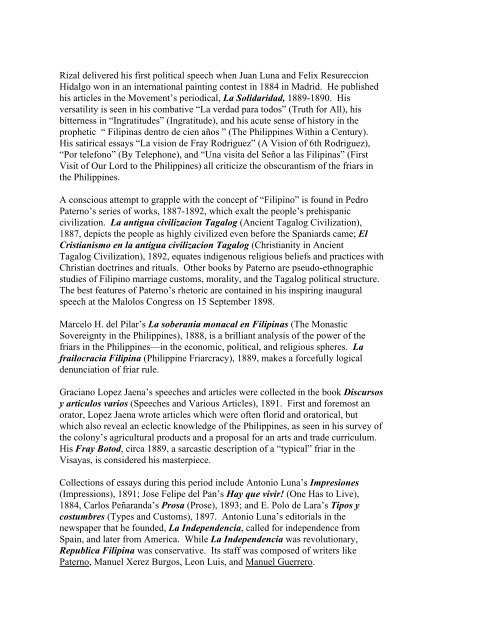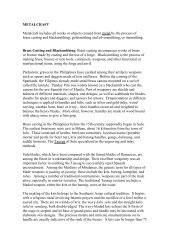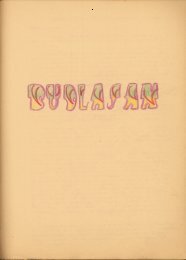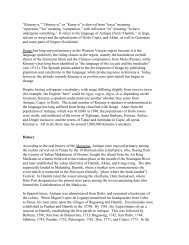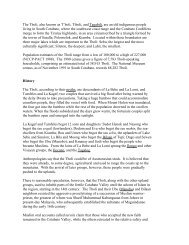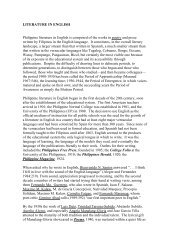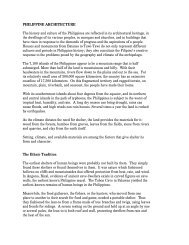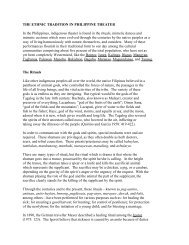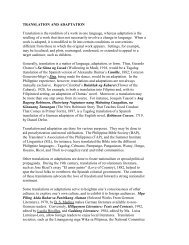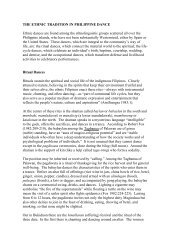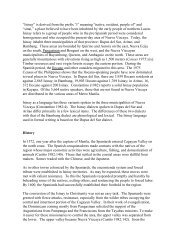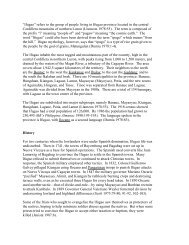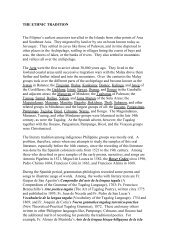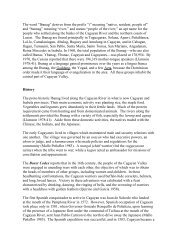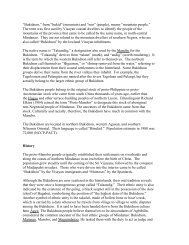LITERATURE IN SPANISH Philippine literature in Spanish includes ...
LITERATURE IN SPANISH Philippine literature in Spanish includes ...
LITERATURE IN SPANISH Philippine literature in Spanish includes ...
You also want an ePaper? Increase the reach of your titles
YUMPU automatically turns print PDFs into web optimized ePapers that Google loves.
Rizal delivered his first political speech when Juan Luna and Felix Resureccion<br />
Hidalgo won <strong>in</strong> an <strong>in</strong>ternational pa<strong>in</strong>t<strong>in</strong>g contest <strong>in</strong> 1884 <strong>in</strong> Madrid. He published<br />
his articles <strong>in</strong> the Movement’s periodical, La Solidaridad, 1889-1890. His<br />
versatility is seen <strong>in</strong> his combative “La verdad para todos” (Truth for All), his<br />
bitterness <strong>in</strong> “Ingratitudes” (Ingratitude), and his acute sense of history <strong>in</strong> the<br />
prophetic “ Filip<strong>in</strong>as dentro de cien años ” (The <strong>Philipp<strong>in</strong>e</strong>s With<strong>in</strong> a Century).<br />
His satirical essays “La vision de Fray Rodriguez” (A Vision of 6th Rodriguez),<br />
“Por telefono” (By Telephone), and “Una visita del Señor a las Filip<strong>in</strong>as” (First<br />
Visit of Our Lord to the <strong>Philipp<strong>in</strong>e</strong>s) all criticize the obscurantism of the friars <strong>in</strong><br />
the <strong>Philipp<strong>in</strong>e</strong>s.<br />
A conscious attempt to grapple with the concept of “Filip<strong>in</strong>o” is found <strong>in</strong> Pedro<br />
Paterno’s series of works, 1887-1892, which exalt the people’s prehispanic<br />
civilization. La antigua civilizacion Tagalog (Ancient Tagalog Civilization),<br />
1887, depicts the people as highly civilized even before the Spaniards came; El<br />
Cristianismo en la antigua civilizacion Tagalog (Christianity <strong>in</strong> Ancient<br />
Tagalog Civilization), 1892, equates <strong>in</strong>digenous religious beliefs and practices with<br />
Christian doctr<strong>in</strong>es and rituals. Other books by Paterno are pseudo-ethnographic<br />
studies of Filip<strong>in</strong>o marriage customs, morality, and the Tagalog political structure.<br />
The best features of Paterno’s rhetoric are conta<strong>in</strong>ed <strong>in</strong> his <strong>in</strong>spir<strong>in</strong>g <strong>in</strong>augural<br />
speech at the Malolos Congress on 15 September 1898.<br />
Marcelo H. del Pilar’s La soberania monacal en Filip<strong>in</strong>as (The Monastic<br />
Sovereignty <strong>in</strong> the <strong>Philipp<strong>in</strong>e</strong>s), 1888, is a brilliant analysis of the power of the<br />
friars <strong>in</strong> the <strong>Philipp<strong>in</strong>e</strong>s—<strong>in</strong> the economic, political, and religious spheres. La<br />
frailocracia Filip<strong>in</strong>a (<strong>Philipp<strong>in</strong>e</strong> Friarcracy), 1889, makes a forcefully logical<br />
denunciation of friar rule.<br />
Graciano Lopez Jaena’s speeches and articles were collected <strong>in</strong> the book Discursos<br />
y articulos varios (Speeches and Various Articles), 1891. First and foremost an<br />
orator, Lopez Jaena wrote articles which were often florid and oratorical, but<br />
which also reveal an eclectic knowledge of the <strong>Philipp<strong>in</strong>e</strong>s, as seen <strong>in</strong> his survey of<br />
the colony’s agricultural products and a proposal for an arts and trade curriculum.<br />
His Fray Botod, circa 1889, a sarcastic description of a “typical” friar <strong>in</strong> the<br />
Visayas, is considered his masterpiece.<br />
Collections of essays dur<strong>in</strong>g this period <strong>in</strong>clude Antonio Luna’s Impresiones<br />
(Impressions), 1891; Jose Felipe del Pan’s Hay que vivir! (One Has to Live),<br />
1884, Carlos Peñaranda’s Prosa (Prose), 1893; and E. Polo de Lara’s Tipos y<br />
costumbres (Types and Customs), 1897. Antonio Luna’s editorials <strong>in</strong> the<br />
newspaper that he founded, La Independencia, called for <strong>in</strong>dependence from<br />
Spa<strong>in</strong>, and later from America. While La Independencia was revolutionary,<br />
Republica Filip<strong>in</strong>a was conservative. Its staff was composed of writers like<br />
Paterno, Manuel Xerez Burgos, Leon Luis, and Manuel Guerrero.


